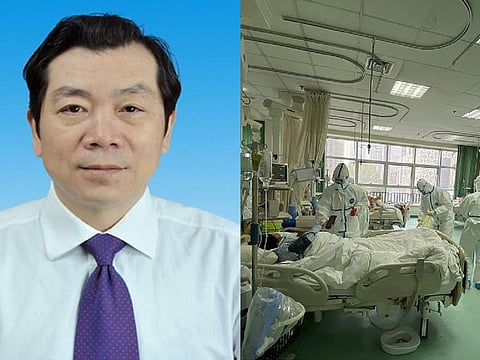'Nobody can leave': trapped Wuhan residents stock up
Police on outskirts of Wuhan turn away car trying to leave virus-stricken city

WUHAN, China: Liang Wudong, 62, who had been treating patients in Wuhan, died from the virus this morning, state-run China Global Television Network reported in a tweet.
Wudong, who was retired but drafted in to help with the outbreak, died on Saturday morning.
Unofficial estimates put the number of infections at up to 7 to 10 times more.
On January 20, SARS hero Dr. Zhong Nanshan, celebrated for his 2003 efforts, gave a televised interview in which he warned that 14 healthcare workers were infected in Wuhan. The expert added that the risk to medical personnel is acute, and severity of threat will rise if the virus mutates, according to a CNN report.
Vehicles turned away
Meanwhile, police at a roadblock on the outskirts of Wuhan turned away cars trying to leave the virus-stricken city on Saturday, as other anxious residents trapped inside spent the Lunar New Year stocking up on masks and medical supplies.
Authorities have prevented anyone from leaving Wuhan, the city of 11 million people at the heart of the viral outbreak which has so far infected nearly 2,000 people and killed 56 others.
AFP saw a steady trickle of cars approaching the roadblocks around 20 kilometres (12 miles) east of the city centre on Saturday morning, only for police in fluorescent jackets wearing masks to tell them to turn around.
The barricade, at one of the tolls for highways exiting the city, was blocked with red and yellow plastic barriers and cones.
"Nobody can leave," a policeman told AFP
A stray dog ran across the empty road in front of the roadblocks, which were shrouded in grey fog and drizzle.
AFP journalists only saw two vehicles allowed to pass the roadblock, including a white van which an officer said was "buying medicines" and would later return to the city.
Authorities extended transport bans to 17 other cities around Wuhan in a gargantuan effort to control the SARS-like virus, restricting travel for around 56 million in Hubei province.
Medical workers
While there are restrictions on anyone leaving Wuhan, a few people were allowed to enter the city through the barricade: Desperately needed medical workers whose holidays were cut short to help overwhelmed hospital.
An empty bus was allowed to pass the roadblock into Wuhan after showing documentation to the police at the roadblock.
Three young nurses who crossed the barrier on foot told AFP they were going to two hospitals. Two of them were waiting for a friend to pick them up.
"We went to our hometowns for holidays before the ban on transportation, but because of the epidemic we have to come back quickly to Wuhan," said one.
Dragging wheelie cases behind them, they were holding their coat hoods up against the rain.
"They need us to go there, otherwise they will be too exhausted," another medical worker who didn't want to be named told AFP.
'Maintain social stability'
In the city centre, temples were closed and holiday festivities cancelled, but people gathered instead in pharmacies to buy medical supplies.
At one store, customers queued at the cash register while staff in protective gear retrieved what they needed and brought it out to them.
Pharmacy staff were in full body suits and gloves, wearing two sets of face masks.
People rifled through boxes of face masks, comparing different makes and models.
Full body suits had already sold out.
Amid fears of rising prices and lack of products, some sales were being restricted and officials were regulating sales.
"My duty is to supervise the price of what pharmacist are selling," said Li Xiang, a market supervisor at one pharmacy.
"Goods must be from official channels and prices shall not be hiked."
Li told AFP that the government was making an effort to "maintain social stability and safeguard people's lives."
A popular traditional Chinese medicine for treating fevers was being restricted to only two boxes per person to manage high demand.
A local radio station played in the pharmacy ran an advert reminding people to wear a mask.
"Everyone is just trying to protect themselves," said one man in a surgical mask who declined to give his name.
"The government is in control of this. It's not a problem," he added.
Meanwhile, in a taxi, a rap song playing on the radio echoed the patriotic fervour, telling people not to be afraid of the virus.
"Wuhan people are strong enough to fight and defeat it," the rapper chanted.
Sign up for the Daily Briefing
Get the latest news and updates straight to your inbox







